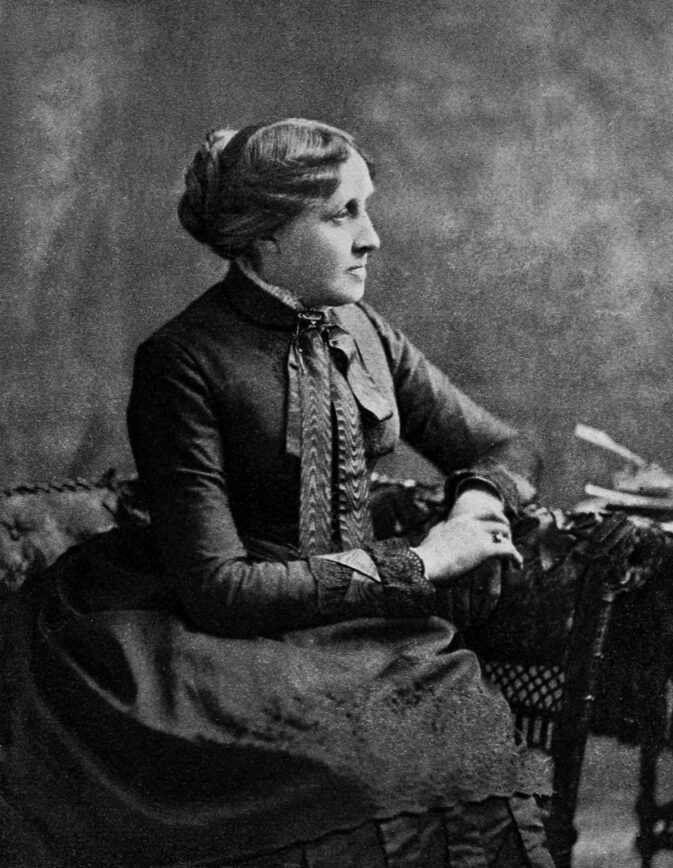Next month, I’ll be teaching a 49 Writers course about suspense as an element of all compelling writing. But in that course—and in this post—I won’t be excluding the suspense genre altogether.
Truth is, many of us are intrigued by the notion of dabbling in this commercially successful category of fiction. Is it just because mysteries and thrillers seem like an easier way to make a buck? (Pssst, it’s not so easy, but please keep reading.)
I planned to start this post with Louisa May Alcott, using her as an example of the financially motivated thriller writer. Until I fell down the Google rabbit hole, I assumed Alcott wrote “blood and thunder” tales because she had to, and that she wrote Little Women because she wanted to.
Au contraire.
About Little Women, which she churned out in two and a half months, Alcott wrote in her diary, “Mr. N. [her publisher] wants a girl’s story, and I begin ‘Little Women.’ Marmee, Anna, and May all approve my plan. So I plod away, though I don’t enjoy this sort of thing.”
She later dismissed her most popular, socially acceptable tales as “moral pap for the young.”
Stephanie Sylverne, writing for CrimeReads, suggests that suspense was Alcott’s true passion, even if she felt compelled to publish it under a male pseudonym.
“I think my natural ambition is for the lurid style … I indulge in gorgeous fancies and wish that I dared inscribe them upon my pages and set them before the public. How should I dare interfere with the proper grayness of Old Concord? The dear old town has never known a startling hue since the redcoats were there.”
Writing Gothic tales of vice, Alcott could indulge her darker side, writing about heroines who “are forceful, independent, sexually demanding, smoke dope and don’t do housework,” according to the New York Times.
Alcott could make serious commentary, as well. Even under the pen name “A. M. Barnard,” one of her novels couldn’t be published in her lifetime. The too-scandalous topic? An abusive, polygamous husband who stalks his new wife all the way to the grave.
My own swerve into suspense was first motivated by pleasurable consumption of books by Gillian Flynn and Lisa Jewell. But my own first attempts floundered until I had a disturbing experience that became the seed of my forthcoming novel, The Deepest Lake, set in Guatemala. Writing that novel was a way of working through a disturbing real-life experience and making commentary on the sometimes-toxic world of creative writing workshops.
If I had to summarize my debut suspense novel in a phrase, I’d say it’s about “women mistreating other women.”
More than two hundred years ago, another apprentice suspense novelist was inspired to make commentary on the unrecorded acts by which “man becomes the destroyer of man.”
William Godwin, now better known as the mostly forgotten father of Mary Wollstonecraft Shelley, had his first major publishing success with one of the first American thrillers ever written: The Adventures of Caleb Williams (1794), about a young man who has to flee after being unjustly imprisoned for knowing too much about his wealthy employer’s crimes. (For more on Godwin and the history of crime fiction over two centuries, check out The Life of Crime by Martin Edwards.)
I didn’t end up writing my novel to “send a message,” and I doubt Godwin did, either. We may begin novels in a state of righteous indignation. But then the stories and the characters propelling those stories take on life. Larger questions emerge.
When it comes to suspense, especially psychological suspense (my favorite type), they’re often rooted in unease: Whom can we trust?
Suspense, at its heart, is about uncertainty. Uncertainty provokes anxiety. But it is a controllable anxiety, available to us in measured portions.
I’d much rather read a book about a man fleeing political persecution or a woman fleeing her abusive husband than live those experiences, obviously. Why we as humans can savor something in print that would traumatize us in real life is one of human behavior’s oddities, if not one of its biggest mysteries. After all, humans seem evolutionarily designed to crave stories that better our own survival and give us a safe way to vent strong emotions.
Some of us enjoy writing those stories, too.
Ready to give it a try?
Andromeda Romano-Lax is a book coach and the author of The Deepest Lake (Soho Crime, May 2024) as well as five other novels. Her November course for 49 Writers will cover suspenseful writing using both fiction and nonfiction examples.


One comment to correct my own post! Godwin’s book was not an “American” thriller but rather an English one. I’m not sure why I was trying to score an extra point for America. Somehow the error slipped in! 🙂
Great insights here and quotes and research – on Alcott and ‘Little Women’ (which Seward High is putting up as a play in a couple weeks) and the draw to read (watch) and write suspense. Great point about material humans savor in print (or on the screen) – agreed – odd and mysterious.
I imagine practicing writing suspense will improve a writer’s timing (among other tricks). The ability to load up a moment. Charge things up. Make them click.
Thanks for this read.